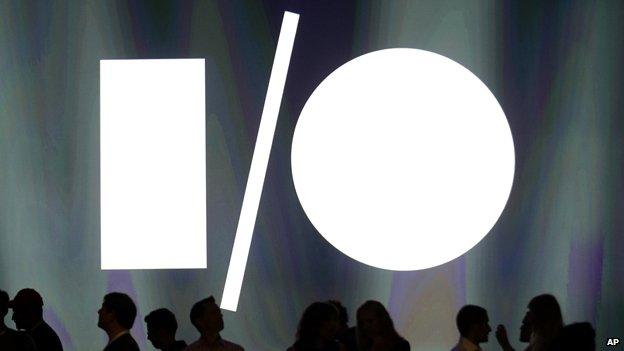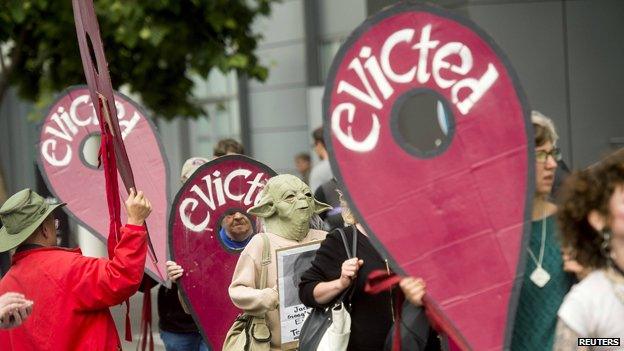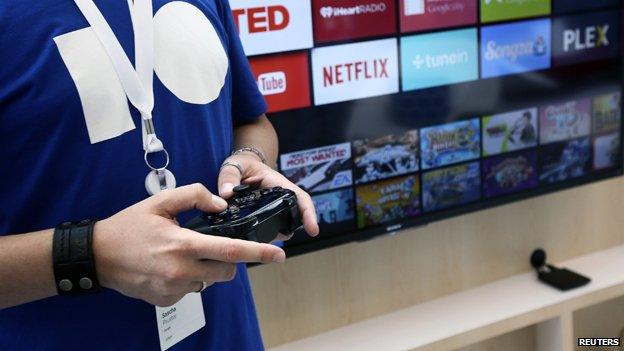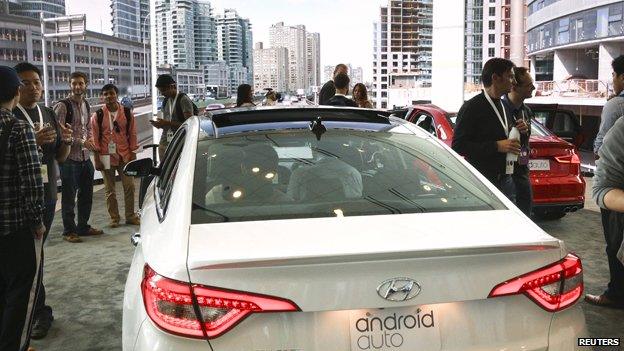Android everywhere at Google I/O
- Published
- comments

Put a couple of thousand developers from around the world in a huge hall, show them some under the bonnet improvements in the software tools they use every day, and pause after each sentence to bathe in the applause. That's the basic recipe for Google I/O which is aimed at the development community, not at consumers.
But Google knows that these days the world is watching too - so it has to sprinkle the conference's opening keynote with a little stardust in the form of some stunts and a few product announcements. Two years ago a live demo with skydivers jumping out of planes and streaming video from Google Glass set the bar very high indeed.
This year there was nothing quite to match that - indeed when a couple of the presentations in a three-hour marathon session were interrupted by protesters I suspected they might have been planted by Google to wake us up.
But between the live cloud debugging demo that went a bit wrong and a lengthy look at a concept called "material design" in the new version of Android, we got a powerful statement of Google's ambitions. This is a company that sees its services becoming vital to every area of our lives, and its principal weapon is its increasingly dominant mobile operating system.

Protests outside Google I/O
Android, already on a billion devices, is going to be everywhere - on your wrist, on your TV, in your car. We were shown Android Wear powering a new range of smartwatches which will know where you are and deliver all sorts of useful information of the kind that Google Now puts on your smartphone. You'll be reminded that your flight leaves soon, get your boarding pass and a weather forecast, see a read-out of your heart rate after a jog, all on your wrist rather than reaching into your pocket. "RIP Fitbit" read one tweet during the demo.
Android TV will power a new generation of connected televisions from major manufacturers, allowing you to search for content by talking to your phone, which becomes the remote control. The presenter said "Oscar nominated movies 2002" and up popped all those films on the screen with options to view them.

Android TV demonstrated via a game controller
"Users don't want or expect complexity from their TV," we were told, so perhaps Google has learned a lesson. This is not its first venture into connected television - Google TV which involved far too much leaning forward and typing never took off in what is a lean-back activity.
And then we were shown Android Auto, which will deliver information via smartphone to drivers.
Again, it depends on voice commands. Tell it to find a route somewhere and Google Maps will do the trick without all that cumbersome tapping on a satnav, ask it to play music and it riffles through your albums. By Christmas, some new models will have this feature built in, but for now the connected car looks like more of a niche interest than some of Google's other projects.
And in all of these areas Google is going head to head with Apple. Tim Cook has promised a new product category this year, and all the indications are that it will be the iWatch. Apple has already announced Car Play, designed to use its iOS operating system to deliver a similar service to Android Auto. And Apple TV got a big boost this week, signing content deals with America's ABC News and AOL, though it remains quite a limited device.
These two giants with ambitions to run our lives have very different approaches. Google sees its job as providing a template through these various flavours of Android and then letting developers and product designers get on with it, with very little interference.

A demonstration of Android Auto
Apple has always been far more controlling and secretive, intent on mastery over every detail of hardware and software before a product is released. That means that Android is ahead of the game in areas like wearables, where big names like Samsung and LG are already churning out devices. The problem is that many of the early products have proved distinctly underwhelming, and if Apple does produce a beautiful and compelling smart watch, Android rivals will have to cut their margins to compete.
One key factor in this battle will be the army of developers who make Android and iOS such powerful platforms. Android is now a much bigger player in the market, but the analyst Benedict Evans tweets today that "Google and Apple numbers show Android app ARPU (average revenue per user) is a quarter of iOS."
In other words, it's much harder making money from Android apps, although that doesn't stop developers rushing to spend $900 to come to the I/O conference. Mind you, Apple's equivalent event WWDC costs $1599 to attend and competition for tickets is just as intense.
Now, though, an army of Android developers have been told there are all sorts of new opportunities for them. They know that in Google they have a hugely wealthy general willing to spend what it takes to make sure its infrastructure is everywhere that consumers spend their time.